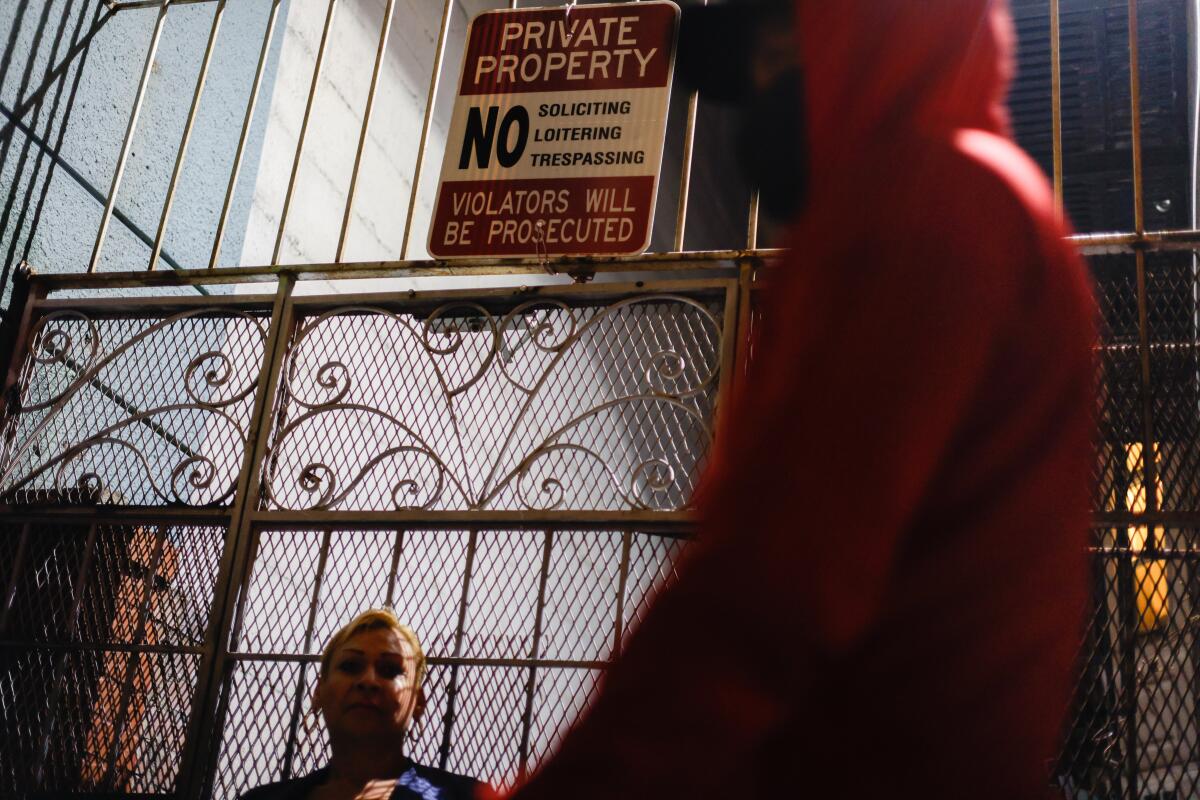As a former sex worker, I know how anti-loitering laws target the wrong people

- Share via
For eight years, I worked as a professional dominatrix. As a financially strapped graduate student for six of those years, I took sessions at hotels during academic conferences. At one such conference, I passed some time chatting with a woman on Tinder. She proposed that we meet at my hotel that evening and go to one of the city’s legendary strip clubs, with cheap drinks and female ownership, known to welcome a queer clientele.
We didn’t end up at the strip club that night. I was running late, still getting ready when the hotel’s concierge approached my date and told her that if she didn’t have a room key, she needed to leave the hotel lobby. My date walked outside and called me to explain what had happened, and that she knew what it meant. Then she left. This wasn’t the first and wouldn’t be the last time a Black woman was mistaken for a sex worker and accused of “loitering” in a hotel lobby, at an academic conference or otherwise.
Over the course of that weekend, I had escorted three middle-aged white male clients through that same hotel lobby. I wore a leather corset under a trench coat when I rode the elevator down to meet them. As a sex worker, I garnered no suspicion. My whiteness allowed me to move through the space undetected.
Anti-loitering laws disproportionately affect Black, brown and trans people: people whose race, sexuality and gender are considered suspect, no matter their profession. Senate Bill 357, the Safer Streets for All Act, would rescind the California law that makes it a misdemeanor to loiter in public with the intent to engage in prostitution. Last year, New York repealed what activists called the state’s similar “Walking While Trans” law, named for the ways police used anti-loitering rules to harass law-abiding trans people assumed to be sex workers.
These laws give police the power to decide what prostitution looks like. Cops determine what kind of clothing one might wear if one intends to sell sex, what kind of body one might have, what color skin, what gender presentation. Black adults make up more than half of the people arrested for loitering with the intent to commit prostitution in Los Angeles despite only being 8.9% of the city’s population.
Anti-trafficking advocacy groups, which seek to abolish commercial sex through the criminal legal system, provide emergency shelter, mental health and drug abuse counseling, and other basic needs to those perceived as trafficking victims. These organizations argue that anti-loitering laws help the police rescue people trafficked into the sex trades. But such groups have no interest in distinguishing between trafficked persons and consenting adult sex workers. Under anti-loitering laws, sex workers and other marginalized populations are vulnerable to being swept up into the criminal legal system.
In Los Angeles, law enforcement refers major anti-trafficking organizations to those who may need emergency services. In exchange for those services, officers often require that a trafficked person agree to cooperate with law enforcement and testify against her trafficker in court, according to researcher Christa Marie Sacco. It’s an often-dangerous offer that makes law enforcement the arbiter of whether a person is a crime victim or a criminal defendant.
The sex workers’ rights movement fully supports putting an end to sex trafficking. But we believe that state-enforced structures — like immigration laws that make undocumented workers vulnerable to deportation and poor women’s lack of access to healthcare and childcare, making them dependent on those who can help — produce the conditions for trafficking. Arrests of trafficked persons do nothing to curb those systemic issues.
We also know that prostitution charges can trigger years of surveillance by the courts, potential child welfare and custody issues, immigration problems and decreased opportunities for education and employment. Neighborhoods and populations vulnerable to exploitation don’t need loitering arrests, they need outreach workers versed in addressing substance abuse, mental illness and domestic violence.
SB 357 passed through the state legislature nine months ago and is finally on its way to Gov. Gavin Newsom’s desk. But it did not have unanimous Democratic support, with the party deeply divided between those who see the damage loitering arrests have done and those who insist wrongly that this measure would aid sex traffickers.
By the end of June, Newsom will have to either sign or veto the bill or let it become law without his signature. Sex workers and allies have spoken on this issue: the criminal legal system is not a source of safety; it is a source of harm. No one in the sex trades should be coerced to stay. Emergency services must be provided to all who need them. But an arrest is not an exit, and fines and jail time are not services.
Chris Belcher is an assistant professor (teaching) of writing and gender studies at USC and author of the forthcoming memoir “Pretty Baby.”
More to Read
A cure for the common opinion
Get thought-provoking perspectives with our weekly newsletter.
You may occasionally receive promotional content from the Los Angeles Times.









